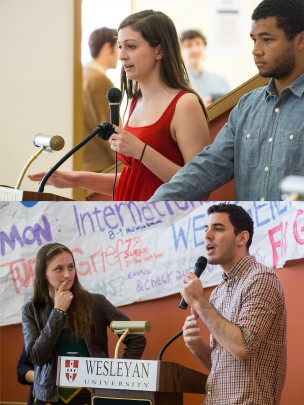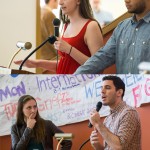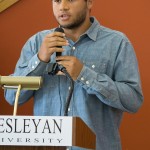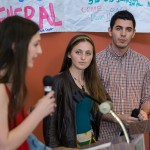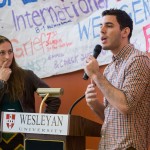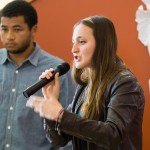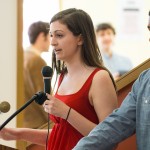Kate Cullen ’16 (President) and Aidan Martinez ’17 (Vice President) and Madison Moore ’16 (President) and Victoria Hammit ’17 (Vice President) sat down with The Argus to discuss their platforms and visions for the 2015-2016 academic year.
Now that the voting period for the Wesleyan Student Assembly (WSA) elections is officially open, The Argus sat down with the two teams of candidates for WSA president and vice president to ask them about their platforms on fossil fuel divestment, Greek life, and the WSA in general. These interviews were edited for length and clarity.
Kate Cullen ’16 (President) and Aidan Martinez ’17 (Vice President)
The Argus: What does an environment that enforces a respectful tone look like?
Kate Cullen: One idea that we’ve put out in our platform, that we’ve been thinking about and that we’ve gotten a lot of support [of] student groups we’ve been meeting with this week, is changing General Assembly so that one week it’s a completely open, town hall style, and the next week it’s a more legislative, more administrative type of meeting; and, of course, both are open to anyone who’d like to come. But it’d be specifically known to everyone on campus that this town hall meeting is for anyone to come in, say what they feel, say how their perceptions about campus—something that’s really bothering them—and my idea in creating these types of meetings [is] that we have some place to grieve together, to celebrate together, to feel like we’re a community together.
A: Are you worried that people will only come to meetings when there’s something they want or want others to act on?
KC: I mean, yes: People come to meetings because there’s something they’re passionate about. But the way I envision the Assembly next year is a coalition of leaders, of people who are just really passionate about what they do, really passionate about this campus, are working on issues they’re already involved in and want to meet with other student leaders to get more feedback and to collaborate. By having issue clusters instead of committees, which is what Aidan and I have proposed…people [will] feel more personally connected and they’ll feel like they’re working together and that there’s more of a sense that if you have some interest in one of these issues, this is the place you should go.
A: Another challenge with constitutional review, and especially with bylaw reform, is the mundane things, the bureaucracy, and that was something that came out in the meeting that you had (on April 1). Do you have a response to the criticism that these sorts of changes would slow the entire process…[that] you wouldn’t have the bureaucracy that the system needs to run?
KC: I completely disagree. In my experience working on the WSA, being a committee leader, I think bureaucracy is something that doesn’t work well for the WSA and doesn’t work well for student government…. Bureaucracy is not in the favor of the people, and it provides for very slow changes. On the real-world Wesleyan level, I think that the changes we’re proposing would be implemented immediately, and a lot of the technicalities that need to be figured out would be figured out over summer break. And that would be Aidan and my responsibility to make sure that happens. The way that I see it is that I’m not getting rid of everything: I’m not recalling the assembly right now; I’m not like throwing a bomb and destroying everything because I have worked in the system, I’ve seen how it works sometimes and how it doesn’t work…. What we’re proposing is to just change the way things are organized so that they’re just clustered into issues…. Each of these clusters would have a leader, so it’s not like there would be no leadership.
A: How would this change who has access to the Board of Trustees?
Aidan Martinez: We feel that, with committee structures, they have so much on their plate that it just doesn’t make sense for them to talk about all these issues. And I find that activists who really care about the issue are more likely to be vocal and share the concerns of the community with the Board of Trustees more effectively. We believe that the cluster structure will allow for an activist voice to be heard in the Board of Trustees meetings.
KC: Honestly, in every Board of Trustees meeting that I went to last year, the Board members asked us to speak up more, and they asked us what our opinions were on a lot of specific issues. I would try to educate myself the best I could on everything that’s going on around campus, but there’s only so much a person can do, and so the Board wants a strong student voice.
A: What do you think about divestment from fossil fuels?
AM: We definitely think that our investments do reflect our morals, and we do think the concerns of students have not been accurately conveyed to the Board of Trustees. So, when they’re making these decisions, they don’t really know the true grit behind it. In terms of fossil fuels, we’re totally people who think we should be divested from it; I mean, our campaign is zero-waste. We think that, in order to move forward in a sustainable way, we need to look at more investment options because in the long run fossil fuels [are] going to die, and it’s not going to turn out the highest profit for the next 20-30 years…. I think the biggest difference between us and our opponents is that we are willing to put pressure on the administration to make change while they’re more concerned with maintaining relationships and making sure that the WSA has a good relationship with the administration.
A: What do you think about Greek life?
KC: As far as coeducation: we are both proponents of coeducation of residential fraternities.
AM: But we also feel that coeducation isn’t the only solution to sexual assault on campus. Binge drinking is also a huge part and, without a coeducation and a binge drinking component, a lot of the attacks made against the fraternities will never be solved. We need to look a little bit more holistically at how we approach the fraternities to make sure that they are a safe space and that everyone feels welcome. Also, we want to make the Inter-Greek Life Council a more integral part of the WSA.
KC: I think there’s definitely a space for Greek institutions. I have close friends that are in Greek life, and I’ve seen how they have really enjoyed it and it has really contributed to them as a community member. I think it’s a good way to build community. We think Greek life is great; we just think that it’s a question of making them safe and open environments for all community members.
A: Broadly, what do you think of your opponents’ platform, and how does it compare to yours?
AM: When you say “platform”—we have talked about this extensively and we don’t necessarily know what the clear, concrete ideas that they have are…. The platform they’re running on has been repeated every single year; every single candidate ever has said that. So we think changing our perspective and coming from a radical viewpoint is actually better because we break away from that mentality.
KC: They’re both great people—intelligent, nice people—I just think that we have very different views on what needs to happen on the WSA and how change needs to be made, and I’m looking forward to the debate because I feel like I haven’t heard what their specific plans are, what they would do in leadership at all. So I’m looking forward to having that conversation with them so we can learn more what their platform is.
A: How aware is campus of your candidacy?
AM: As far as talking to campus and going around, it’s sometimes a bit comical and sometimes a bit sad. You sometimes have people who think that the WSA is completely gone because of the sit-in that we held. We have people who are unsure of where we stand, who are unsure of me as an individual. So it’s a matter of going around campus and really showing that we want to make institutional changes that really support everyone on campus and not just an exclusive segment.
A: Aidan, a lot of people are concerned about your specific candidacy because of your actions this spring. How do you view yourself as a candidate with that baggage?
AM: That is something that actually affected me a lot and it has plagued my thoughts. I don’t think it’s a fair characterization of me because I am so heavily invested in the first-generation, low-income community that when I hear offensive words and thoughts conveyed about them, I can’t help but not separate my emotion from it…. I feel as though people in power want to maintain their power, and for the first time in a long time the WSA is scared of who is going to get the power. The fact is that they shouldn’t be scared or any of that: if they’re really invested in moving toward a more equitable and inclusive assembly, it’s about getting ideas on the table to make sure that all students feel empowered to talk.
Madison Moore ’16 (President) and Victoria Hammitt ’17 (Vice President)
A: How solid is your platform?
Victoria Hammitt: I think we have a lot of super-specific, solid plans. One of the first things we want to do is institute “office hours,” as we’re calling it, so that students can come and speak one-on-one with WSA members. So that’s a really concrete thing that we think will increase the accessibility of the WSA.
Madison Moore: We don’t have anything like that right now. The EC [Executive Committee] and the WSA as a whole doesn’t really have a face right now—not many people even know who’s on it…and it’s worrisome to us that that is something that is going on, that that’s the status quo.
VH: In terms of structure of the WSA, our fairly solid platform is that we want to keep a lot of the structure of the committees the same as they are now in terms of having them be Academic Affairs or Student Affairs, as opposed to the clusters that Kate and Aidan are suggesting. So, it’s not really a change that we’re suggesting, but that is our platform, that is the structure that we want to see next year. But some of the committees or groups associated with the WSA—the SBC, the SJB, Spring Fling Committee, Sound Co-op—we want to make some adjustments in the ways that these organizations are both accessed by the student body and, perhaps, the way that they’re managed. We want to make sure that there’s greater student input in these committees.
MM: One thing that people thought was unneeded was the operating committee of the WSA. The [Operating Committee is] responsible for keeping the website up-to-date, keeping everyone informed through newsletters and things like that. It kind of got consolidated down to just the coordinator position…. So, what I want to do is bring it back—maybe not necessarily in its former form—but another committee that is responsible for keeping up outreach, making sure everything is in public record and available for everyone to see because if [students] have questions or they just want to contact us in general, they should be able to.
A: A lot of people find with the WSA that it’s less a problem of having access to information or to specific members than it is simply not having an impetus to go and reach out to them. How do you want to change that?
VH: Well, I think first of all just publicizing it in general. You can’t want to be involved with the WSA if you don’t know what it is. The WSA canvassed recently and the most often heard question, at least for me, was “What is the WSA? What does it do?”…. So if the Facebook page is posting to WesAdmits every week, like “Here’s what the WSA did this week, here’s what we do,” then people will become much more invested in what’s going on just because they know about it.
MM: When I went canvassing I asked, “Do you know what the WSA has done this year?’ and the three most common answers were “no,” “oh yeah, they put all the couches in SciLi,” and—because of The Argus coverage—first generation issues. Those were the three things just because people don’t know, they don’t think that the WSA does anything…. But we’ve done a lot this year. We’re working on a new textbook resolution that gives teachers more information about the costs of textbooks…. And we’ve been trying to find ways to make the WSA more accessible to low-income students or people on financial aid who don’t have the time required because they need to work.
A: How do you feel right now about where you stand in the elections? Have you done any outreach? Do you have any impressions about who the campus is supporting?
VH: We have a Facebook event that we’ve posted on the Facebook pages; we’ve both individually reached out to people involved in different groups on campus. I spoke at an AEPi meeting recently, and we’ve also been in contact with some of the current WSA members…. I can’t say for sure who people are going to vote for, but we have gotten a good reception for our platform and the things that we stand for.
A: What do you think about your opponents’ platform?
MM: Well, we know it, but we’ve tried to stay away from going against what they believe and, instead, just trying to be the best candidates we can be. So a lot of our points aren’t in opposition—in fact, we feel the same way about a lot of things, like transparency—it’s just different in how to achieve those things. We all want the same basic things; we just feel that our way is more effective to get to them.
VH: I attended an open forum of theirs…. I don’t think it’s doing a disservice to them to say that a lot of things are still in the works.
MM: Another part of their platform, that they want to completely abolish the constitution and start from scratch, I think is very idealistic, and I think that it’s good to have very large goals sometimes, but I think that in restructuring the WSA it takes a very long time to accomplish this…and [in the interim] you’d want it to continue functioning.
A: A lot of people think that that’s [abolishing the constitution is] the only way anything is going to get solved. What would you say to those people?
VH: I’ve asked people specifically, “What are the systematic injustices within the WSA?” and the only answer I’ve ever gotten is the time issue, that if you need to work a job then maybe you don’t have the time you need to commit to the WSA and that makes it unrepresentative of certain populations. But I think that’s being addressed right now with the stipend that hopefully is about to pass. And I personally haven’t heard anything that anyone can point to as a systematic problem of the WSA in terms of poor representation of people.
MM: I think there’s a conservative approach, there’s a progressive approach, and there’s an idealistic approach. You can still be on the side of progressivism as long as you’re brought back down in the sense of realism. And I think that’s what Victoria and I want to do: bring back down the idealistic approach and base it in realism.
A: What do you think about fossil fuel divestment?
MM: A lot of the time fossil fuel divestment clashes with financial aid…. The administration is very hesitant to go away from these fossil fuels because they are the most lucrative investments we have. So a lot of the issue is that if we sacrifice investing in fossil fuels, we’re also going to have to lose a lot of the financial aid packages we give and become less financially inclusive. We already have a very low endowment as a school, so the constant struggle is do we take a moralistic stand on divesting from fossil fuels and lose a lot of the money that’s going to financial aid, or do we push back and say, “Let’s increase our endowment and our access to financial aid packages” so that we become more accessible to students of low-income and make a more diverse campus… And, personally, I worry a lot about the financial aid aspect.
VH: I think, just in terms of dealing with the issue more generally, it’s a sort of thing where this would be a really great time where getting the Wesleyan community writ large more involved with the WSA is very beneficial because, as Madison said, there are two really important interests that are involved on campus and that are clashing in this. This is an issue where we have to be able to pose the question to the entire student body, “Which do you want right now?” because we can’t have both.
A: What do you think about Greek life?
MM: I think what’s going on right now is that Beta is gone for many reasons, and I have a lot of feelings on that—I think that a lot of things they did were not good…. But I think that with PsiU and the way that they’re coeducating right now is a great thing. The fact that they’re being more inclusive of marginalized groups on campus is a great thing. However, I also feel for DKE because I wrote a bill last year that was in conjunction with the WSA resolution that got passed and it was for cohabitation of the spaces, not necessarily coeducation. It was to have the frats that could go coeducational to go coeducational, but for DKE, who by their national charter cannot become coeducational, I said, “Look, let’s try to fix the problem with the spaces…before we make DKE disband; let’s see if this can work.” That’s my stand on DKE, Beta, and Psi U.
- Jonas Powell, Photo Editor
- Jonas Powell, Photo Editor
- Jonas Powell, Photo Editor
- Jonas Powell, Photo Editor
- Jonas Powell, Photo Editor
- Jonas Powell, Photo Editor
-
Concern
-
Anonymous
-
